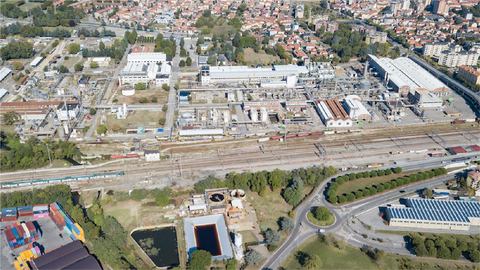New Trinseo PMMA Depolymerization Plant Reimagines Plastics Value Chain With Sustainability In Mind
- None.
- None.
Insights
Analyzing...
Technology produces quality on par with virgin material without sacrificing performance
-Process enables the efficient recycling of PMMA-based materials
-Scheduled to be commissioned Q1 2024 in Rho,
-Supports continued transformation of the company’s portfolio to focus on sustainability-driven innovation

Trinseo Manufacturing Operations, Rho,
Depolymerization is a chemical recycling technology which is complementary to more traditional mechanical recycling processes. While mechanical recycling is vital to a successful circular economy, depolymerization creates brand new opportunities by reducing the polymer back to its constituent monomers. This allows for the recycling of a wider variety of PMMA-based materials, supporting an increase in recycled content and overall recycling rates, and helping reduce the manufacturing demand for virgin materials.
“Innovation in recycling technologies is imperative to effectively recycle various types of materials. This new facility is yet another major achievement towards a scalable system with the goal of making PMMA a truly circular material of high quality,” said Trinseo’s Chief Sustainability Officer, Francesca Reverberi. “When combined with our own in-house sourcing and treatment of collected materials through our Heathland recycling operation, our PMMA depolymerization plant will offer a high-performance solution for a world increasingly looking for new ways to address sustainability in the plastics supply chain,” added Reverberi.
Trinseo’s depolymerization facility is being developed around a continuous recovery model to produce high quality recycled PMMA that matches the quality of its virgin counterpart, promoting a circular plastics value chain without compromising performance. Using this advanced recycling technology, the introduction of recycled monomer into the supply chain helps support achieving targets for lowering carbon emissions, water consumption, and the conservation of natural resources, as indicated by the MMAtwo project's environmental benefits calculator. A shift towards PMMA depolymerization can help deliver sustainability benefits for consumers, manufacturers, and industries alike. From car lamps to signage and more, this technology creates the opportunity to give a range of everyday products a second life and beyond.
Material produced using the depolymerization process will be integrated as part of Trinseo's distinctive “R-Life” portfolio designed around a commitment to sustainability, covering both mechanically and chemically recycled PMMA grades. These products find applications across mobility, construction, and consumer goods, aligning with the growing demand for products that are developed with sustainability in mind.
About Trinseo
Trinseo (NYSE: TSE), a specialty material solutions provider, partners with companies to bring ideas to life in an imaginative, smart and sustainably focused manner by combining its premier expertise, forward-looking innovations and best-in-class materials to unlock value for companies and consumers.
From design to manufacturing, Trinseo taps into decades of experience in diverse material solutions to address customers’ unique challenges in a wide range of industries, including building and construction, consumer goods, medical and mobility.
Trinseo’s approximately 3,300 employees bring endless creativity to reimagining the possibilities with clients all over the world from the company’s locations in
Cautionary Note on Forward-Looking Statements
This press release may contain forward-looking statements including, without limitation, statements concerning plans, objectives, goals, projections, forecasts, strategies, future events or performance, and underlying assumptions and other statements, which are not statements of historical facts or guarantees or assurances of future performance. Forward-looking statements may be identified by the use of words like "expect," "anticipate," “believe,” "intend," "forecast," "outlook," "will," "may," "might," "see," "tend," "assume," "potential," "likely," "target," "plan," "contemplate," "seek," "attempt," "should," "could," "would" or expressions of similar meaning. Forward-looking statements reflect management’s evaluation of information currently available and are based on our current expectations and assumptions regarding our business, the economy, our current indebtedness, and other future conditions. Because forward-looking statements relate to the future, they are subject to inherent uncertainties, risks and changes in circumstances that are difficult to predict. Factors that might cause future results to differ from those expressed by the forward-looking statements include, but are not limited to, our ability to successfully implement proposed restructuring initiatives, including the closure of certain plants and product lines, and to successfully generate cost savings and increase profitability; our ability to successfully execute our business and transformation strategy; increased costs or disruption in the supply of raw materials; increased energy costs; compliance with laws and regulations impacting our business; conditions in the global economy and capital markets; our ability to meet the covenants under our existing indebtedness; our ability to successfully investigate and remediate chemical releases on or from our sites, make related capital expenditures, reimburse third-party cleanup costs or settle potential regulatory penalties or other claims; and those discussed in our Annual Report on Form 10-K, under Part I, Item 1A —"Risk Factors" and elsewhere in our other reports, filings and furnishings made with the
View source version on businesswire.com: https://www.businesswire.com/news/home/20231206633138/en/
Brian Risinger
Director, Corporate Communications
brisinger@trinseo.com
Source: Trinseo






